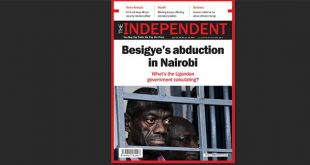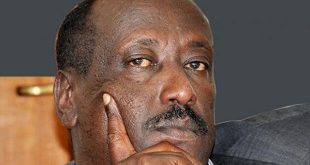
By Jon Qwelane
I respond to the article ‘Apartheid in post-apartheid South Africa’ by Andrew M. Mwenda (The Independent, November 12-18, 2010).
Mwenda’s piece is much like the proverbial curate’s egg “ it is good in places. My summation is that it is very bad in the places where it is bad.
Mwenda’s decision was rather a knee-jerk reaction to attack my country so terribly and was prompted by the three days he flew between Entebbe, Nairobi, Harare and Lusaka (‘staying in hotels’). Had he done the simple thing of acquainting himself with the facts surrounding the matter of our transit visa rules, he could have saved himself a lot of breath“ and us the vitriolic and largely unfounded attack.
Right from his opening paragraph, Mwenda disregarded the rules: ‘On October 24th, I went to Entebbe Airport to catch a South African Airways flight via Johannesburg to Namibia. Airline officials said I needed a transit visa through South Africa. (My italics, for emphasis.) So far, so good “ he has been told what the situation is. And what did our intrepid traveller do when he learned this? ‘I explained that I was not going to enter the country, only to change flights in the airport.’ And the clanger, in his own words: ‘You still need a transit visa. These are new rules, a lady told me.’
But did Mwenda follow the advice he was given? No. ‘Frustrated, I went to Kenya Airways and booked a ticket via Nairobi to Lusaka from whence I could catch Namibian Airlines to Windhoek, Namibia.’
Clearly Mwenda was the architect of his own miseries. Had he followed the advice he was given at the SAA terminal, he would not have gone through his harrowing and very regrettable ordeal.
Mwenda’s unwarranted sneer at the African Union is nothing else but just that. Like the curate’s egg, his piece is good in places. He has a point, though, in his contention that the new visa requirements “do not apply to British, Americans, Irish and other Europeans (or nations of white people); so my colleagues going to the same conference from the United States and Europe faced no problems transiting through that country (South Africa).”
The new visa rules have not come about as a matter of spiting our African brothers and sisters, or as some kind of racist hangover by South Africa. Mwenda’s explicit attempt to make South Africa a country that is ‘racist’ in the visa rules is untrue and regrettable.
Our Department of Home Affairs (whose Minister is a highly principled woman and former struggle combatant, Dr Nkosazana Dlamini-Zuma, also former Foreign Affairs Minister) crafted the rules, which came into force in June this year when it became clear that many Africans from the continent often travelled to neighbouring states such as Namibia, Botswana, Lesotho, Swaziland, Zimbabwe and Mozambique and from there attempted to obtain visas to enter South Africa. Alternatively, they entered the country illegally and surreptitiously from those countries.
We have never experienced such problems with Americans, British, Irish and other nationals mentioned by Mwenda, regardless of their colour.
The charge that South Africa employs the new rules against Africans except on her neighbours “ Lesotho, Swaziland, Botswana, Namibia and Zambia is another of the exceedingly few good places about Mwenda’s curate’s egg. But as stated above, the insinuation that the new rules have a racial slant to them is patently false.
One is humbled to learn that Mwenda helped advance our national struggle against apartheid and, speaking as one who took part in that battle against institutionalised injustice and oppression, I am grateful to Brother Mwenda and similar others. However, I never thought I would live to see the day when a fellow African would boast loudly and without a tinge of shame about his contribution to our cause. I suppose all South Africans must prostrate themselves before the Mwendas of this world to offer profuse gratitude!
It is true many African countries ‘committed (their) resources to the struggle against apartheid’. But to degenerate into exaggerated generalisations (‘Black people today continue to suffer one million and one indignities’; Africans are humiliated beyond description daily’ etc) is to lose the plot.
I will never pretend South Africa is a perfect country; we are still living with the deleterious effects of centuries of colonialism and decades of apartheid, and I daresay 16 years of African-led rule is still very short but huge strides have been made during that time.
Another point is that the formation of the Organisation of African Unity was not about disregarding issues such as the territorial sovereignty of its member-states; rather, at its inaugural meeting the OAU reaffirmed, with several members unhappy, the need to respect the borders demarcated across the continent by the colonialists. Similarly, the African Union took over from where the OAU left off. So to argue that the ‘small things we can do that can correct a lot of these colonial distortions’ should mean that “we do not need grandiose ideas like African Unity or the East African Federation’ is being too simplistic to the point of being irrelevant.
In an ideal world, we need “the removal of visas within Africa, removal of border controls “¦ for our people to begin to move and trade freely on this continent’.
In the real world, however, any half-baked town planner will tell you that the infrastructure of the suburb of Nakasero (or any other planned part of a city anywhere) with its estimated 20,000 residents needs to be planned carefully. The houses must accommodate the right number of residents, the sewerage system must be adequate to support those numbers, so must the fresh water supplies, electricity, schools, clinics, etc.
Where you overload the available supplies is when you begin to face serious problems, such as we currently have in South Africa. The country now accommodates about eight million extra inhabitants, the majority of whom are illegally immigrants from other African countries.
With Mwenda’s simplistic solution of ‘removal of visas within Africa (and) removal of border controls’, the available resources and facilities in South Africa “ seriously overstretched as they are “ would be in an unspeakable state.
Finally, Mwenda and other people wishing to transit through South Africa must obtain a transit visa; there are no exceptions to this rule, unless one does not ordinarily require travel permits.
******
Jon Qwelane is the South African High Commissioner to Uganda
qwelanej@foreign.gov.za
 The Independent Uganda: You get the Truth we Pay the Price
The Independent Uganda: You get the Truth we Pay the Price


